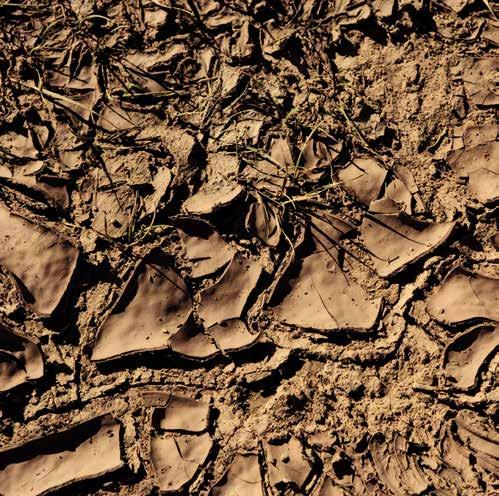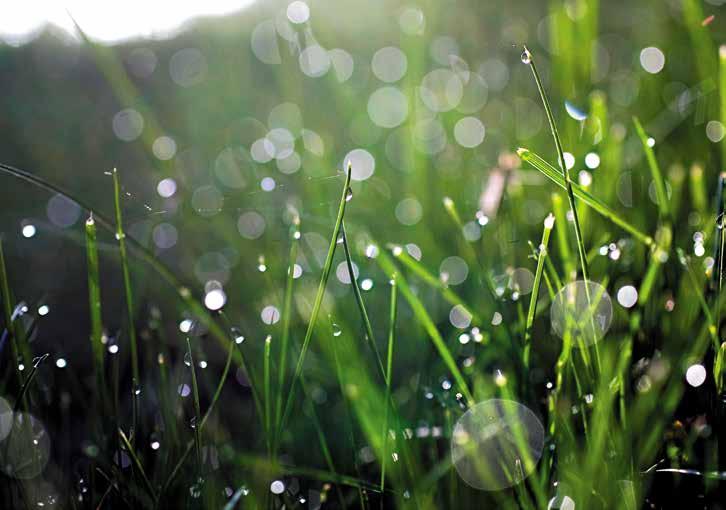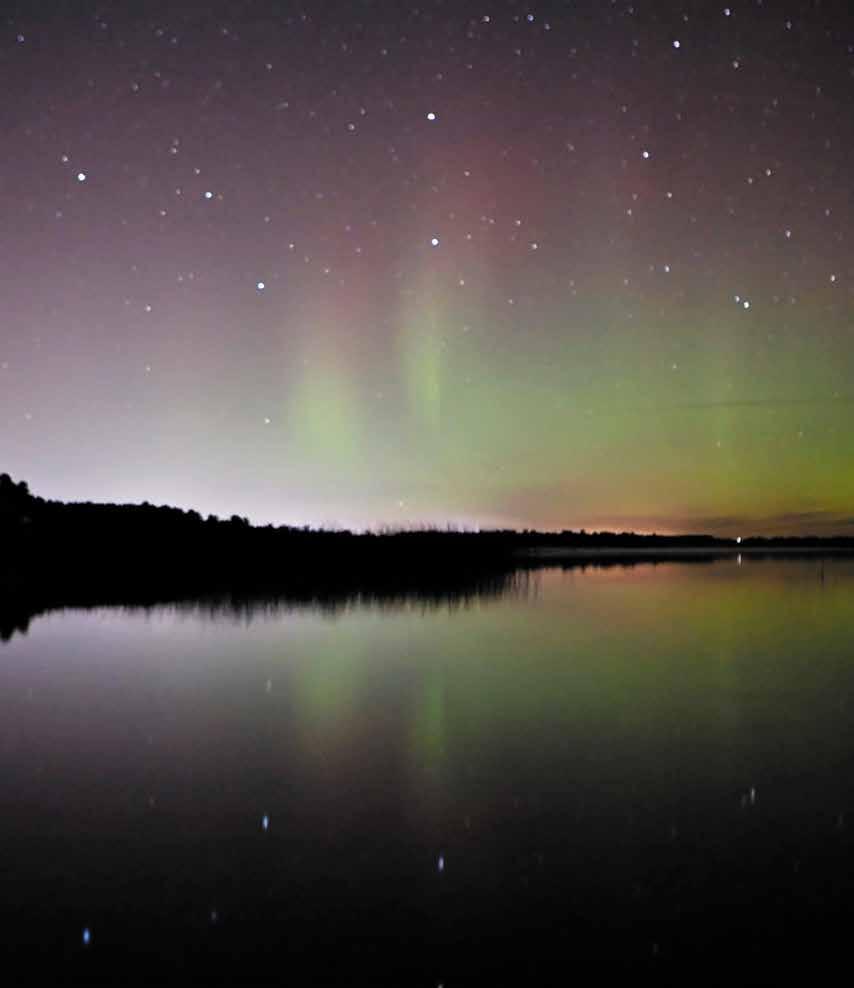
10 minute read
Wild Business: A Philosopher Goes Hunting
By Lawrence Cahoone
I was invited to lunch at an upscale Boston restaurant. My hosts, academic gourmands, ordered a sampler of unusual meats, wedges of tripe, pork brains, etc. I was not used to this, but as a guest I enjoyed the novelty. Since quail, pheasant, and duck were on the menu, I asked whether other game meats were served, and offered that my only effort in this direction was a venison liver paté I had made. Intrigued, one of my hosts asked where I had gotten the liver. I told him it was from a deer I shot. He grimaced and looked away.
Advertisement
In urban and suburban America, and among the educated classes, hunting is often viewed as immoral and uncivilized, and in a decreasingly rural America, the rise of animal rights and animal welfare philosophies has supplemented a cultural turn away from hunting. We are in an odd position. We probably kill more animals than any society in human history—we are eating more meat than most cultures have been able to supply—and our incessant construction of buildings, roads, airports, and the like take away animal living spaces. But we simultaneously find the actual killing of animals abhorrent. There is a great disconnect between our indignation and the way we eat, drive, and build. Evidently, decent, sensitive, socially conscious people do not shoot and butcher animals; they pay minimum-wage workers to do it for them. We even apply this indignation outside our species, sending our children to movies like Shark Tales, where nasty carnivores are taught to be nice herbivores—then after the movie we stop for burgers. The philosopher has to ask the straightforward question: is hunting immoral?
Recent theories of animal rights ascribe to some non-human animals entitlements not to be harmed, while utilitarian theories of animal welfare count animal goods and harms as comparable to human goods and harms. Both conclude that we have moral obligations to avoid harm to animals; doing so needs a justification and can be permitted only if the harm is small enough and/or the human good that comes from it is great enough. In practice, this means animal experimentation, fur-wearing, and meat-eating are generally unjustifiable. Thus, from this perspective, if contemporary hunting is killing animals for sport—in effect, for fun—then it would seem to be, as Joseph Wood Krutch once called it, “pure evil.”
Now, most contemporary hunting in America, like hunting by indigenous peoples, provides another good, namely nutrition. Most hunters eat what they kill. This itself is a good reason for not regarding contemporary hunting as a sport, but rather a cultural activity in which modern people try to return to an older practice of finding wild meat themselves, instead of raising domesticated animals and slaughtering them, or paying a rancher, processor, and butcher to do it for them. In the discussion that follows, I will restrict myself to considering hunting in which the prey is eaten. So, my question changes from whether hunting is immoral to whether hunting for food is immoral?
Notice that animal rights and animal welfare claims have a problem when it comes to how we treat wild animals. They do not fit well with ecology or environmental ethics. The latter generally agree that animals have value we ought to honor morally, but their priority is to preserve habitats and biodiversity. Thus, for most environmental ethicists, or anyone who thinks ecologically, wild and endangered animals are more valuable than domesticated and plentiful ones; animal deaths are a natural, even good feature of ecosystems; and vegetation, waterways, and terrain features are goods we may be obliged to protect even at the cost of animal lives. For example, if local populations of deer increase so much that they destroy vegetation or even cause erosion—Aldo Leopold once remarked that “a mountain lives in fear of its deer”—some environmentalists would support culling the herd. Then there is the issue of predation. If a rabbit has a right to life, doesn’t a coyote violate this right just as much as a human hunter does? Environmentally speaking, predation—animals killing animals—is a beneficial part of ecosystems, and to prevent the coyote from eating the rabbit is to harm not just the coyote but the ecosystem. The point is that animal rights and welfare views, which were invented mostly to deal with human harm to domesticated animals, need to be softened to deal with wild nature. Despite this complexity, there is a pretty reliable, although not inescapable, moral claim we can make: if eating meat is moral, then so is hunting. It would be difficult to argue that modern animal husbandry causes less harm to animals than hunting. Hunting probably causes more pain than most modern industrial killing techniques, although it likely causes less pain than the animal’s death from disease, starvation, exposure, or predation in nature. But hunting allows the animal its wild, free life until death, rather than subjecting animals to the stress of crowded feedlots or even the restrictions of free range grazing. And, if an act is immoral, hiring someone to do it for you is too; it can’t be that killing an animal yourself is wrong, but hiring minimum wage workers to do it for you and out of your sight is okay. Again, hunting is only immoral if meat-eating in general is immoral.
So, is it? Along with animal rights/welfare arguments, some assert a moral obligation to be vegetarian by noting that meat-eating is wasteful, that we could feed far more people by eating the grains we feed to domesticated animals, in effect eating lower down on our cultivated food chain. This might well be, but notice it does not apply to hunting, since hunted animals must by definition be wild, and they must feed on wild plants or other animals.
Note also that even for animal rights and animal welfare arguments against meat-eating, the latter is wrong only because there is an alternative method of gaining the good it brings—nutrition—namely, farming, especially farming for high protein crops such as soybeans. Killing animals for food is wrong, they say, because we have another food production option that doesn’t kill animals.
But farming does kill animals. Farming colonizes otherwise wild lands and replaces them with artificial monocultures requiring a constant fight against wild nature’s re-colonization of that land. Farming kills animals by taking away habitat; by poisoning ground water with pesticide and fertilizer; by pollution from fossil-fuel-using machinery, refrigeration, and transportation of produce; by intentional killing of local herbivores to protect crops; and by machinery passes that kill ground nesting animals. Farming is by definition more environmentally intrusive than the selective, in-person culling of one or a few wild animals. Hunting significantly damages ecosystems only when unregulated by wildlife managers. That of course has happened, notably in North America in the 19th and early 20th centuries, particularly because of unregulated commercial hunting. But such hunting is now illegal, and hunting is strictly regulated, with licensing fees and taxes on hunting equipment going to protect wildlands and species. That is what wildlife biologist Valerius Geist calls the North American model of public hunting, and it has successfully restored many wild species in recent decades.
Data on the number of animals killed by farming are hard to come by, but some sources indicate that farming’s animal deaths per nutritional unit is comparable to or greater than the animal deaths per nutritional unit for some kinds of hunting, e.g. of large animals like deer. That is, it is probably true that a unit of protein from hunted venison kills fewer animals than the same unit of protein from farmed soybeans when you add farming’s habitat destruction, the environmental harms to the deer or groundhogs the farmer shoots to save his crops, and all the rabbits, birds, snakes, and frogs killed by tilling, planting, and harvesting machinery. The philosophical, or moral, point is clear: farming and hunting both kill animals. The question is which type of farming or hunting, in which environment, regarding which crop or animal species, kills more or fewer animals for the same meal. The choice between hunting and vegetable farming is not a black-and-white choice between killing and not killing, but a choice between gray shades of more and less killing.
What about other goods of hunting? Are there any? Is there any other reason to hunt than nutrition? There are. Regulated, licensed hunting not only provides food, but performs what is at present a crucial role in limiting wildlife species that have no other natural predators. More personally, hunting may be the most responsible form of human carnivory. It embodies what is, from the point of view of environmental ethics, a central virtue, namely trophic responsibility: awareness of and personal involvement in the sources of our food. This is the same sort of awareness that comes from vegetable gardening.
It is also a fact that hunting has long carried special meaning for its practitioners, meaning most homo sapiens who have ever existed (farming began to replace hunting only ten millennia ago). In the cosmologies of indigenous peoples the predator–prey relation was a moral relationship. It was an exchange in which the human provided the animal respect and thanks, a cultural immortality, and a limit on species populations, while the animal provided humans food and a lesson in the secrets of reality. Animal food was not a what but a revered who, pursuable only by the discerning seeker, a who that dies and becomes the seeker, transforming the latter in the process.
Although today’s hunters are not animists, they do engage in a similar practice. Hunting renews their membership in our human lineage and in the animal sphere, plunging us into the wild on what I call “wild business,” to pursue our existence by its rules according to the bargain of animal existence where life lives at the expense of life. As Ted Kerasote put it in his book Bloodties: Nature, Culture and the Hunt, “The elk in the forest, the myriad of small creatures lost as the combines turn the fields, and the Douglas fir hidden in the walls of our homes—every day we foreclose one life over another … Given this condition and my final inability to escape from it, I decided to go back to hunting … because it attaches me to this place and the animals I love, asking me to own what each of us ought to own in some personal way—the pain that runs the world.”
Now, the critic of hunting may respond that even if pain “runs the world,” we shouldn’t add to it. True enough. But as I have argued, contemporary hunting does not add to the anonymous animal suffering caused unseen by consumers (omnivores and vegetarians alike), but replaces it with death caused personally and directly, in which the animal’s life is intimately recognized and responsibility is taken.
In conclusion, we can say that animal death by hunter is on average less painful than death by farmer or by nature, and while it is more painful than death by enlightened animal husbandry, death by hunter allows the animal its wild life. Regulated, ethical hunting embodies the goods of trophic responsibility, honest carnivory, and a rare experience of animal inter-dependence. Even if one does not credit those goods as balancing the animal lives it takes, hunting must still be moral wherever preservation of species or ecosystems requires hunting as the only viable wildlife management tool, or where the animal cost of farming per unit of nutrition is equal to or greater than that of hunting. Both conditions hold at least some of the time. If so, then in a modern society where both meat-eaters and vegetarians are ever more distant from the sources of their existence, it is arguably good that some choose temporarily to return to the archaic practice of hunting, an activity common to many animals and essential to their ecosystems, so that the participatory awareness of the way life uses death in animal nature does not vanish from human society.
Lawrence Cahoone is Professor of Philosophy at the College of the Holy Cross in Worcester, Massachusetts. His most recent book is Cultural Revolutions: Reason versus Culture in Philosophy, Politics and Jihad (Penn State Press). An avid hunter, he lives with his wife and two children in southeastern Massachusetts.










